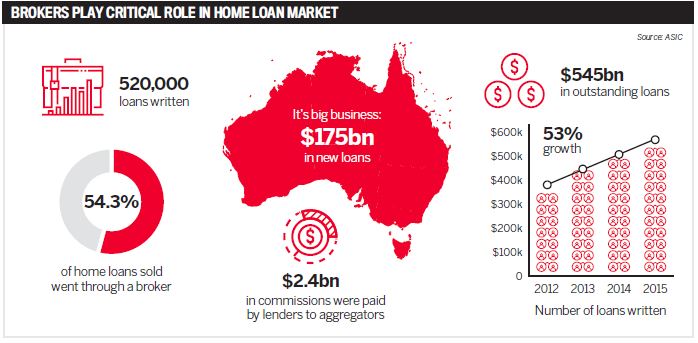In their submissions to the Treasury and in interviews with Australian Broker, mortgage brokers tell us what they’re really thinking about the ASIC remuneration review and how they see it all playing out
Raise the topic of ASIC’s Review of Mortgage Broker Remuneration and every broker has an opinion. Whether they’re willing to express that on the record is another matter.
As expected, their opinions run the gamut. Some brokers are supportive of a few of ASIC’s findings, while others dispute the report’s merits and question why it was done it the first place.
Some shrug and say they’re carrying on caring for their clients and would prefer not to get drawn into any controversy or negative stories in the press.
But while many insist it’s “business as usual”, the importance of the review cannot be ignored, especially when the outcome could affect brokers’ income.
In the last issue, we covered what the aggregators, banks, associations and consumer groups had to say in their public submissions. This issue, we’re turning to brokers.
Were brokers fairly represented?
“My general overall view, and it has been this for some time, is that there’ve been a lot of people involved in this process and yet there’s never been a brokers’ representative,” Ben Anson, principal at Legend Finance in Sydney, told
Australian Broker.
“And yet if all the brokers, 10,000 of us, went on strike for a month tomorrow, we would grind lending in Australia to a halt. I think we have been treated quite disrespectfully, quite condescendingly, given that there’s no brokers’ representative.”
Anson is not the only one who feels like brokers haven’t been fairly and sufficiently represented in this process – in ASIC’s review itself, then in the submissions, and now in the self-regulation process.
Glen McKissack, CEO of Loans Actually, a company in Victoria with 38 mortgage brokers, said he had hastily amended his submission after discovering that his aggregator, PLAN, would be incorporated into
NAB’s response.
NAB’s submission to the Treasury called for upfront commission to be calculated net of offset account balances.
“I am therefore concerned that this will be tainted by National Australia Bank and there clearly needs to be a view from a mortgage broking business,” he wrote.
Another broker, Maria Rigoni, director of Universal Wealth Management in Victoria, said in her submission that she had given up being a member of either the
MFAA or the
FBAA. “I believe they have a conflict of interest with lenders and cannot represent the mortgage brokers’ position in stakeholder meetings because of that conflict. They add no value proposition to my mortgage broking business.”

More responsibilities, less commission?
Prior to 2004, upfront commission was 1%, while today it’s 0.65%, Anson says. “How many jobs out there have taken a 35% pay cut? And yet our job load has increased because of all the additional compliance, credit reporting, the National Consumer Credit Protection laws, responsible lending. We’ve now become the compliance arm for the banks and the aggregators, our costs have increased and yet our remuneration has sunk.”
While brokers now have more onerous responsibilities, their remuneration hasn’t reflected that. “How much more qualified do banks want us to be?” says Anson, who has three degrees, including an MBA.
While all of the broker submissions rejected changing how commission is calculated, such as by LVR, many proposed setting commission at a standard level across all lenders.
Hilko Siegers, director of Everfirst Financial Services in Perth, wrote that standardised commissions “remove one level of confusion for our clients”, but he warned that trail commission must be protected as it covers “non-paid process activities like discharges, loan switches and security substitutions, and all this before office, car, phone and other business activity running costs”.
To draw the conclusion that commissions based on loan size have poor consumer outcomes is “both incorrect and unproven”, McKissack said.
“The size of the loan is only important in the fact that it directly correlates with the client’s needs. … Very few clients have shown any concern for how much I am paid for obtaining a loan that will ultimately help them achieve their goals.”
In many cases, it’s the client asking for a bigger loan amount for investment purposes or as an emergency buffer, not the other way around.
Harj Dhillon, director of Central Lending Solutions in Perth, said in his submission that brokers in no way encouraged clients to increase their loan size. “This is ludicrous to think we do this. We work with the client to find a product which suits them and generally find a loan with the lowest possible rate which will reduce their monthly repayments.”
So, what happens next?
What brokers reiterated in their interviews with Australian Broker and in their submissions to the Treasury was that the current commission model works and it provides consumers with better choices and positive outcomes, something many backed up by referencing brokers’ 50% market share.
“All of these changes of policies and reviews are still looking to fix a system that was not really broken. The government started looking closely into mortgage broking because people were chasing more and more brokers over banks – that in itself should be sufficient to determine that the presence of brokers delivers a better customer outcome,” says Xavier Quenon, director of Go Mortgage Corporation in Queensland.
Broker Barry Thatcher said in his submission that what could be improved was the removal of soft-dollar bonuses, which he said were “undisclosed and unnecessary”. Many others agreed with this point.
He and Shawn French, a broker at
Smartline, also said brokers should be more qualified and have some minimum educational qualifications.
“It is too easy for someone who has no experience and no qualifications to become a mortgage broker; hence it encourages unsuitable people to join the industry. It belittles the industry by having unqualified brokers giving financial advice to clients,” French wrote.
While Anson, of Legend Finance, says he doesn’t want to see any changes to commission, except for it going up, he believes ASIC will feel compelled to make modifications to justify “all the huff and puff that’s been going on”.
Quenon echoed this, saying he hoped changes were not made just for the sake of it.
“I am hoping that they are able to demonstrate to the government that the current system is mostly sound, even if some tweaks can be made on the edges,” he says. “Sometimes leaving the system the way it is is the best course of action.”




